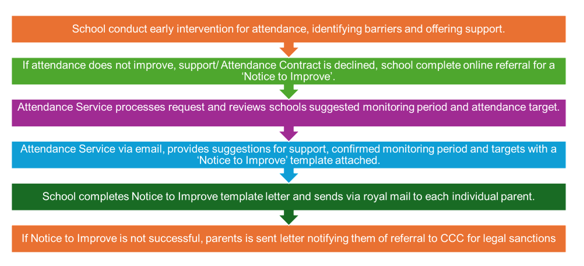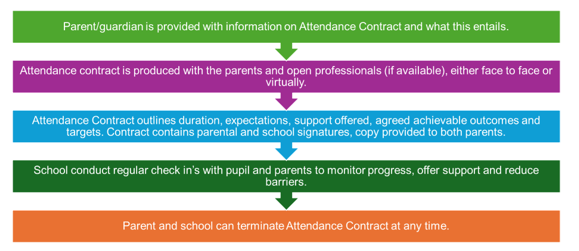Evidence has shown that tackling absence can be most effective when a number of different approaches are taken by schools to encourage attendance. Environmental factors need to be considered and schools need to offer appropriate support based on individua need. Schools should have an attendance policy and communicate processes to all staff, parents, students and the community. Schools will be required to take a balanced approach when dealing with attendance matters. Schools should consider the journey for the child in accessing education, which will therefore enable schools and professionals to be mindful of external barriers which affect attendance.
Many attendance issues can be resolved by working with parents and children, and schools need to develop an inclusive approach to meet needs as early as possible and deliver appropriate pastoral support interventions. Schools should communicate frequently with parents about positive achievements and improvements, however small, and in ways which emphasis the responsibility and role of parents to ensure that their child receives an education. Before discussing a student’s poor attendance, we recommend establishing a positive relationship with parents whilst being sensitive of their circumstances.
Parents need to be made aware of their responsibility to ensure that their child attends school regularly. Schools are expected to develop a graduated response when engaging parents before the Local Authority will consider a referral for more punitive sanctions.
Early intervention
The offer of support should be continuous, even if referrals for legal sanctions have been made. Schools should regularly review the support offered to assess the impact, making further adaptations if needed.
Absence due to illness needs to be raised sensitively with pupils and their parents with meetings being offered by the school as a way of intervening early and providing support. Most minor illness are self-limiting and do not require contact with a GP. Please see our 'Medical Needs' section for more information: Medical Needs (cambslearntogether.co.uk)
If once you have followed medical needs pathway and the tiered approach has not been effective you can consider attendance processes, but this should be on an individual basis.
Schools should avoid waiting for a child’s attendance to slip to 90% or below before taking appropriate action. Support offered and early intervention should be tailored to the individual needs of the child and family, this includes the type of communication which is used i.e. a parent who is dyslexic may prefer a phone call to multiple letters etc.
As per the DfE guidance ‘Working Together to Improve School Attendance’ two pathways are available, at least one must be used prior to legal sanctions being initiated. Prior to the pathways being used, schools must offer early intervention, in the form of:-
- Telephone calls: Schools should be mindful that for some parents on low income they may not have the ability to call back or sufficient credit to listen to voice messages.
- Letters and/or emails: Letters can be sent via Royal Mail or as an attachment to an email, however each letter/email should be addressed to each parent separately to avoid evidential difficulties. Letters which contain a legal warning must be sent via Royal Mail for court purposes.
- Offer of attending an informal Attendance Support Meeting: School should consider the location of the meeting and offer parents the option to attend virtually. School should be mindful of the day of the week and timing of the meeting to help improve engagement i.e. a parent who works nights etc.
- Offering parent/carer an Attendance Contract: School should be mindful of how this offer is made, i.e. some parents may require an informal telephone call or face to face chat to understand what an Attendance Contract is and their rights i.e. it’s voluntary and can cease at any time.
- Exploring pupil voice: Schools should ensure that the pupil’s voice has been captured, this applies to both primary and secondary school age pupils.
- Offer of an Early Help Assessment: Schools should offer an EHA on multiple occasions, enabling parents/carers the chance to reflect on this offer. If the support of Target Support service could be beneficial, schools should try to understand the reason behind why a parent has declined, in order to reduce any barriers and concerns of the parent.
- Referrals to the following support services and assessments: CAMH, YOUnited, medical professionals, EHCPNA, etc.
- Referrals for internal support: Counselling, mentoring, trusted adult, safe space, toilet pass, adaptations, tiered approach to medical needs (if appropriate).
Notice to Improve pathway
The notice to improve pathway can be used if the following criteria have been met.
- Parent has been offered an Attendance Contract and declined/ didn’t respond to your offer – in despite of clear attempts to gain engagement and remove barriers to accepting this support.
- Since April 2024 – PCM has been attempted but parent did not attend or PCM was not successful, and no legal sanction has been issued since then.
- Parent has been prosecuted in open court within the last three years for attendance (not term time leave).
- Minimum of 10 unauthorised absences have occurred within the last 10 school weeks, or attendance is less than 90% over a wider period and majority of absence are unauthorised.
If the above criteria have been met, school can complete an online referral form for the Notice to improve pathway in our 'On Line Referral' section: All Referrals Forms (Penalty Notices (including withdrawal) and Prosecutions / CME / EHE (cambslearntogether.co.uk)

It is important that the Notice to Improve template provided by the Attendance Service is used and tailored to the individual pupil, as instructed by Legal Panel. Without this, it is possible that legal sanctions cannot be initiated or would need to be withdrawn due to evidential difficulties.
The Notice to Improve letter must be sent via Royal Mail to each parent/carer as the letter contains a legal warning, a legal sanction will not be issued if the letter has only been sent via email.
If the target has not been reached by the end of the monitoring period, but engagement and school attendance has clearly improved, school can extend the monitoring period rather than reaching immediately for punitive approaches. If this is not the case and the target has clearly not been met, school must send each parent a letter, notifying them that the monitoring period has not been successful and a referral to the Attendance Team has been made. A template has been prepared for you and this can be found in our 'Template Letters' section on Learn Together: Template Letters (cambslearntogether.co.uk)
Detailed information about the Notice to Improve, best practice guide can be found on our 'Webinar and Training' section on Learn Together: Webinars and Training (cambslearntogether.co.uk)
Attendance contract
An Attendance Contract is a voluntary agreement between school and parent/carers that can last between 3 – 6 months, even longer if felt beneficial. The Attendance Contract can end at an earlier date and parents can opt out of the Attendance Contract at any time.
The aim of the Attendance Contract is to set achievable outcomes and targets which are mutually agreed by all and felt beneficial to remove barriers to accessing education. The contents of the Attendance Contract provide a focus on support in place and enable all involved to measure the impact of the interventions.
The Attendance Contract pathway is an alternative to the Notice to Improve pathway, it is a nurturing approach to support families to access support and improve attendance. This pathway is appropriate for parents/carers and pupils accessing support and who are engaging.
The initial Attendance Contract meeting and any further meetings can take place face-to-face or virtually; however, it is essential that a signature has been obtained on the Attendance Contract from at least the primary care giver if parents are separated, but preferably from both parents if possible. If both parent/carers live together, then the Attendance Contract must be signed by both parents/carers to avoid evidential difficulties. If the Attendance Contract is unsigned by either parent (when they live together), this would indicate that the parents do not consent to the Attendance Contract and therefore the Notice to Improve pathway can be followed.
The Attendance Contract should be reviewed regularly, this can take place during other meetings such as TAF’s, CIN etc. The key is to nurture and offer support, recognising that for many parents/ carers, attending multiple meetings can be stressful and cause disruption.

To support the Attendance Contract pathway we have produced sample templates for all schools to use. Whilst Multi Academy Trusts can create their own, we strongly recommend that our templates are used. Templates can found in our 'Template Letters' section on Learn Together: Template Letters (cambslearntogether.co.uk)
There is a clear order for the letters within the Attendance Contract process, please see pdf attachment below for the Attendance Contract process map.

